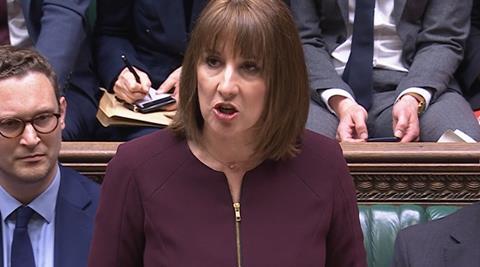Chancellor spares construction from spending cuts as OBR halves 2025 growth forecast
The government will invest a further £13bn in capital infrastructure over the next five years, Rachel Reeves announced in today’s Spring Statement.
The chancellor committed to spending £2bn on infrastructure each year over the course of this Parliament above the £100bn promised in last year’s autumn Budget.
An extra £2.2bn will also be handed to the Ministry of Defence next year as part of plans to bring defence spending up to 2.5% of GDP by 2027.

Sparing construction from a raft of spending cuts focused on welfare payments and the civil service, Reeves said she was boosting capital investment in public sector projects to “drive forward the economy”.
“I am not cutting capital spending as the party opposite did time and time again, because that choked off growth and it left our school roofs literally crumbling. That was the wrong choice, it was the irresponsible choice, it was the Tory choice,” the chancellor said.
The extra spending will support “growth-enhancing investments” including infrastructure, housing, and defence innovation, according to Treasury documents published this afternoon.
It comes as part of a package of measures aiming to balance the books after £10bn of fiscal headroom at the time of the autumn budget was wiped out by an increase in the cost of servicing government debt.
Reeves said cuts to welfare payments announced today would save £4.8bn, while a crackdown on tax avoidance and evasion would add £1bn to Treasury coffers.
While the Office for Budget Responsibility (OBR) has halved its growth forecast for 2025 from 2% to 1%, it said the chancellor’s measures would put the government on course to restore its £10bn fiscal headroom by the end of the Parliament.
Arcadis head of strategic research Simon Rawlinson said: “The construction industry will take comfort that the chancellor focused on our sector in the speech rather than on health or education. Our sector benefits from the borrow to invest fiscal rule.”
He added: “Reeves has been badly knocked off course in the first nine months of this parliament but seems to have succeeded in persuading the OBR that the medicine will work. When it comes to investment, only time will tell.”
McBains managing director Clive Docwra said the increase in defence spending would benefit construction firms operating in the sector, he lamented a lack of encouragement for investors and developers to commit to housing projects.
The OBR forecast contained positive notes for the government in housebuilding, predicting last year’s changes to the National Planning Policy Framework could see 1.3 million homes built during the course of the Parliament.
Combined with other planning reforms, including in the Planning and Infrastructure Bill, the OBR said this would increase GDP by 0.2% by 2029/30 and 0.4% by 2035.
Reeves said this will take Labour within “touching distance” of its promise to build 1.5 million homes in England this Parliament.



























No comments yet